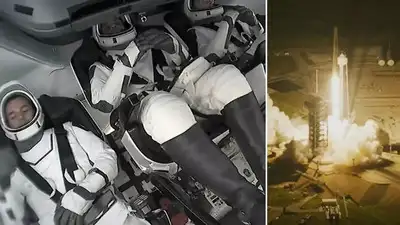Group Captain Shubhanshu Shukla of the Indian Air Force has successfully reached the International Space Station (ISS) aboard the Axiom-4 mission, becoming the first Indian in nearly four decades to return to Earth’s orbit. The mission, launched via SpaceX’s Dragon spacecraft at 12:01 pm IST on June 25, rekindles the nation’s legacy in human spaceflight and signals India’s deeper engagement in global scientific cooperation and low-Earth orbit commerce.
The historic flight comes 40 years after Wing Commander Rakesh Sharma’s celebrated mission in 1984, when he spent eight days aboard the Soviet Salyut 7 space station. Sharma remains etched in national memory not just for his pioneering space journey but also for his iconic response to then Prime Minister Indira Gandhi’s query from Earth:
“Sare Jahan Se Accha, Hindustan Hamara.”
In contrast, Shukla’s voyage is part of a growing era of commercial, multi-national space collaboration. His selection for Axiom Space’s private orbital mission, backed by NASA and SpaceX, marks India’s arrival in a new space age—one that blends national prestige with entrepreneurial innovation. His participation underlines India’s emerging role as a contributor, rather than just a spectator, in the international space economy.
Officials from the Indian Space Research Organisation (ISRO) and the Ministry of Defence hailed the launch as a vital step in the run-up to India’s own indigenous human spaceflight programme, Gaganyaan, planned for later this decade. Aerospace policy experts noted that this mission places India at the intersection of scientific diplomacy and technological autonomy.
Trained extensively in the United States and Russia, Shukla underwent months of rigorous astronaut conditioning, which included simulations in orbital mechanics, microgravity medical response, and technical station operations. As a decorated Air Force officer with thousands of flight hours, his technical acumen and leadership made him a natural choice for high-impact research aboard the ISS.
On the scientific front, Shukla is tasked with conducting biomedical experiments focused on cardiovascular health in microgravity—research with significant crossover benefits for healthcare on Earth, particularly in understanding ageing and circulatory disorders. He is also expected to support operational systems aboard the space station, offering inputs for sustainable orbital habitats.
But beyond the technical and diplomatic layers, the mission has stirred the collective imagination of the Indian public. Shukla’s emotional social media message ahead of liftoff, in which he expressed gratitude to his family, friends, and mission team, resonated deeply. His words, “No one travels to space alone,” became a unifying sentiment, celebrating the contributions of those behind the scenes.
The launch also sparked a wave of national pride. Social media channels were flooded with tributes, with the hashtag #ShubhanshuInSpace trending for hours. For many, the image of an Indian astronaut carrying the Tiranga on his shoulder signified more than just scientific achievement—it symbolised a collective dream, revived after decades.
Observers say India’s re-entry into the human spaceflight domain is not just about replicating past milestones but redefining the country’s approach to inclusivity and innovation in science. With the ISS expected to retire by the end of this decade, India’s presence on this orbital platform positions it strategically for future partnerships in space tourism, orbital manufacturing, lunar exploration, and more.
The participation of an Indian officer in a Western-led commercial mission is also being seen as a bridge between legacy cooperation and new-era diplomacy. Axiom-4, unlike previous government-dominated ventures, is a commercial effort involving multiple international players—setting the template for future missions that blend private capital, national interest, and global science.
Space historians have already begun drawing parallels between Shukla’s mission and Sharma’s legendary journey. But while Sharma symbolised India’s Cold War-era space ambitions, Shukla represents a newer, borderless scientific vision—one that is sustainable, inclusive, and forward-looking.
Importantly, Shukla’s mission is also being seen as a cultural touchstone. By publicly sharing his emotional and patriotic reflections, he has made spaceflight more relatable for millions of Indians, especially the youth aspiring to careers in STEM, aerospace, and planetary science.
As India continues to position itself as a leader in eco-friendly, gender-equitable, and sustainable scientific innovation, missions like Axiom-4 are proving that the country is not just dreaming big but is actively building the future.
In a poetic and poignant message from orbit, Group Captain Shubhanshu Shukla connected with a billion hearts back home. His words, delivered with pride from the ISS, echoed across the nation:
“Namaskar Mere Pyare Deshwasiyon. Kaafi Saal Baad Hum Phir Wapas Antariksh Mein Pohonch Gaye Hain. Kamaal Ki Ride Thi. Mere saath Mere Kande Pe Tiranga Hai..”
He concluded his message with: “Jai Hind, Jai Bharat.”
Also Read : Sudhanshu Shukla becomes first Indian to return to ISS orbit After 40 Years


